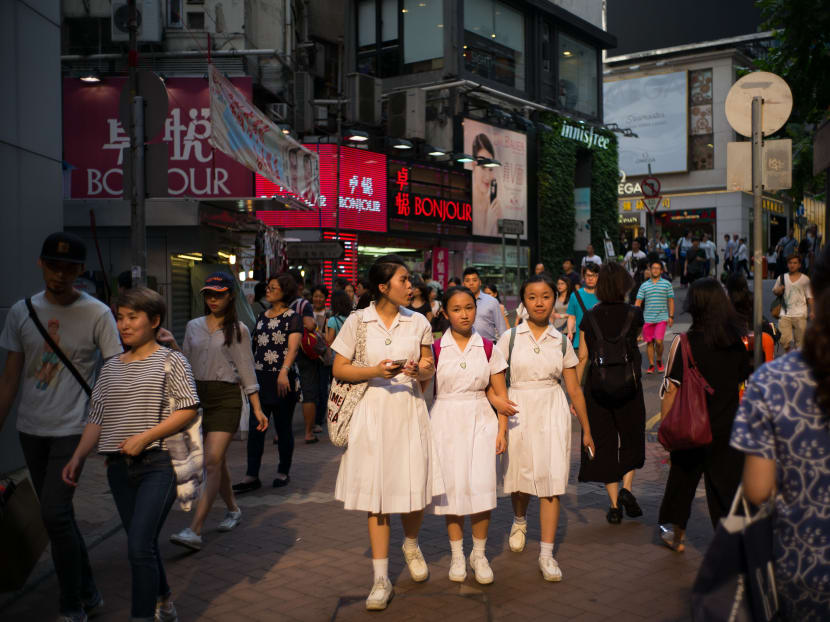HK not equipping students for the future as well as S’pore, S Korea: Study
HONG KONG — Hong Kong students are less prepared than their peers in Singapore and South Korea to work at a time when technology will be king and migration will increase, meaning they may lose out on jobs, according to new research that measures inputs to the education system in 35 territories.
HONG KONG — Hong Kong students are less prepared than their peers in Singapore and South Korea to work at a time when technology will be king and migration will increase, meaning they may lose out on jobs, according to new research that measures inputs to the education system in 35 territories.
In the Worldwide Educating for the Future Index, Hong Kong came in 14th – behind Singapore, Japan and South Korea. The index is produced by The Economist Intelligence Unit (EIU) and it assessed how well education systems prepare people aged 15-24 for the future. It was released on Tuesday.
Unlike indices that look at student performance through test scores, said the EIU, the index looked at inputs into education systems in terms of education policy, teaching and socio-economic environments. It is the first of its kind to focus on the students’ preparation for the future, and is designed to help governments see how they can improve.
New Zealand is ranked first in its ability to prepare its students for the future, followed by Canada and Finland. Singapore is ranked fifth, followed by Japan in seventh place. South Korea is placed 12th and China came 31st out of 35 places ranked.
“This is really a call to action,” said Ms Trisha Suresh, a senior consultant at the EIU, which is the research and analysis division of The Economist Group. She noted that even the top-ranked countries – New Zealand, Canada and Finland – had a lot to improve.
Ms Suresh said the countries that did not prepare students for the economy of the future “just won’t be as competitive”.
“The world of tomorrow is going to be very different from today. It’s always changing, we need to be prepared for it, and this is one attempt to nudge governments into thinking about education differently,” she said. “This is an attempt at creating a blueprint for what it means to educate for the future.”
Fewer than half of the economies surveyed put sufficient focus on crucial fields such as global citizenship and project-based learning, said the EIU.
The 35 territories ranked account for 77 per cent of the global population. The index assessed how well they were preparing students for a world where they would need interdisciplinary, creative, analytical, entrepreneurial, leadership, digital and technical skills, as well as global awareness and civic education.
It used a combination of quantitative measures, such as government education spending, and qualitative measures, such as the quality of career counselling, to assess countries in three areas: Teaching environment, policy, and socio-economic environment.
The index found China needed to improve in all three areas, especially its teaching environment, where it ranked second worst. Like other populous countries, China has an extra need to improve, as it has a big workforce, said Ms Suresh.
In the area of education policy, Singapore ranked first for its education policy, compared with Hong Kong, which was ranked 22nd.
Ms Suresh noted that Hong Kong lacks a comprehensive policy when it comes to equipping youth with skills for the future, adding that the city had started making efforts in that direction.
To prepare students for the future, said the report, countries need a curriculum focused on future skills, ways of testing those skills, and well-supported teachers who are equipped to teach them.
Career counselling and a vibrant civil society that addresses issues relevant to the economy of the future also help, it said.
“It’s thinking about the world we are going to live in,” said Ms Suresh, noting that maths and science would still be important in the economy of tomorrow.
The study was commissioned by the Yidan Prize Foundation, set up by Mr Charles Chen Yidan, co-founder of mainland tech giant Tencent. The findings were released to coincide with the announcement of the foundation’s inaugural Yidan Prize, which aims to encourage research and innovation in education.
“Education is like medicine; it must be provided to all,” said Mr Chen. He added that he had decided to dedicate his life to education as it had “changed his life” by providing him with opportunities.
The first recipients of the prize, who each got a cash prize of HK$15 million (S$2.6 million) and a project fund of HK$15 million, were Stanford University Professor Carol Dweck, who researches how psychological mind-sets can influence a student’s success, and Ms Vicky Colbert, who directs Colombian non-governmental organisation Escuela Nueva. SOUTH CHINA MORNING POST







